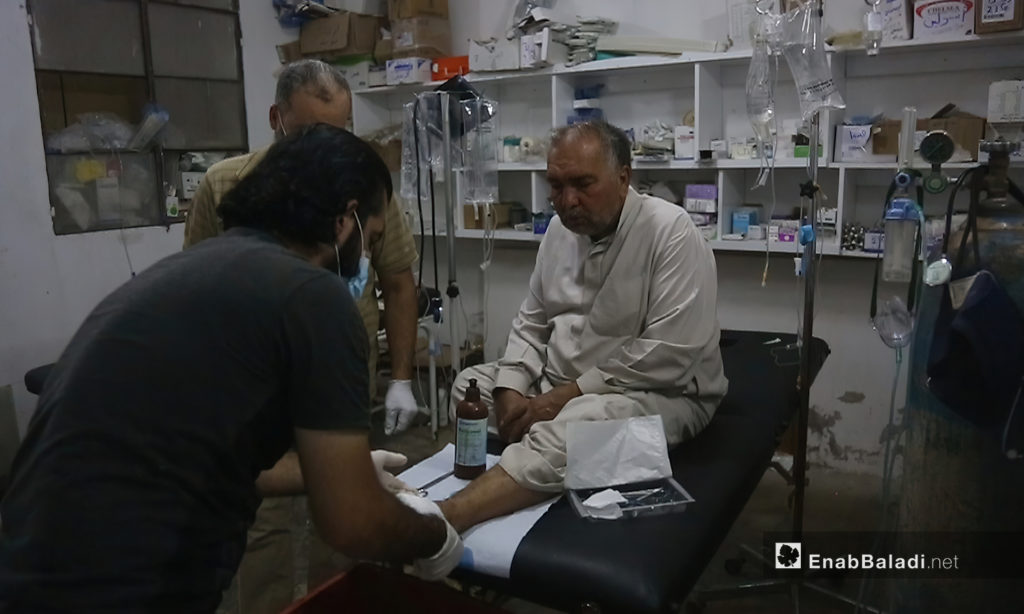Enab Baladi – Idlib
“ If the degree of his injury is very severe, maybe he can make it, maybe not to the hospital,” this is how Sakhr Badran described the danger of having to help the injured and sick travel tens of miles to get medical care.
The residents of Jabal al-Zawiya, south of Idlib, suffer from the deterioration of the health status in the absence of medical organizations. There is only one medical first aid center operated by some volunteers without specialized doctors’ presence or supervision.
In a poll conducted by Enab Baladi in the region, through the “What is your problem” program, some residents complained about the lack of hospitals or medical centers in the area, despite the return of residents who were forced to flee at the beginning of this year.
There is no medical center within 35 kilometers (21.7 miles) of Jabal al-Zawiya, which poses risks to the patient’s life and exacted “exorbitant” costs depending on his family’s living standard.
“Danger” … a cause and an effect
Badran’s son was injured as a result of heavy shelling on the town of Ihsim.
Badran had no other options but to save his son’s life by rushing to a remote hospital, in which doctors there managed to remove three of the four shrapnel stuck in his small body.
“The area has no healthcare center; we are forced to use our private vehicles to move or transport the injured or the patients to Idlib or Bab al-Hawa because there are no ambulances.”
The medical center in the region does not have the equipment and adequate healthcare staff to treat shrapnel wounds. However, the center is equipped to provide treatment for minor ailments, first aid, and pharmaceutical services.
The center receives around 120 patients per day while critical or difficult cases are referred to hospitals in Idlib,” said the center’s director, Muhammad Nazir al-Khatib told Enab Baladi.
The Director of the “Civil Defense Center” in Jabal al-Zawiya, Tariq Alloush, said that emergency teams work daily to transfer more than 15 medical cases to Idlib, which is more than 40 kilometers (24.8 miles) from the area.
Through his participation in Enab Baladi’s survey, Ahmad Rahal described the health services available in the area as “zero,” indicating that the health center only provides pills or injections; the very sick and injured people have to rent private cars to reach nearby hospitals.
Al-Khatib believes that Jabal al-Zawiya suffers a lack of interest and care because there is a widespread fear that the area might be bombed constantly since it is perceived as a contact line. However, “and to the contrary,” most of its residents have come back to their homes, and more focus and care should be given, al-Khatib emphasized.
The fate of Jabal al-Zawiya remained unknown even though it has been months since the Russian and Turkish guarantors agreed to a ceasefire, and the Syrian regime forces have advanced south of the international highway “M4” since March 5.
About one million people were forced to flee the violence in the northern countryside of Hama and southern Idlib to the north during the military campaign. Nevertheless, more than 220 thousand people chose to return to the area until the beginning of last September despite the continuing violations, as estimated by the Office for the Coordination of Humanitarian Affairs (OCHA).
The number of military violations of the ceasefire agreement reached 2,793, according to a statement issued by the “Syria’s Response Coordination Group” on 21 September, which caused 29 deaths, and targeted 13 vital installations.
Waiting for reply
According to Muhammad al-Khatib, the healthcare center is communicating with medical organizations and is waiting for them to re-open hospitals or medical centers in the area.
Hassan Qaddour, head of the hospital department in Idlib’s health directorate, told Enab Baladi that the fear of bombings and the Syrian regime forces’ advancement into the area, although months have passed since the organization and hospital withdrew, remain the first obstacle to the return of their services to the area.
Qaddour confirmed that Idlib’s health directorate is still communicating with organizations to reactivate health centers and hospitals in Jabal al-Zawiya and considered that the area’s security situation has become “somewhat acceptable” for their return.
Youssef Gharibi, Enab Baladi correspondent, contributed to the preparation of this article












